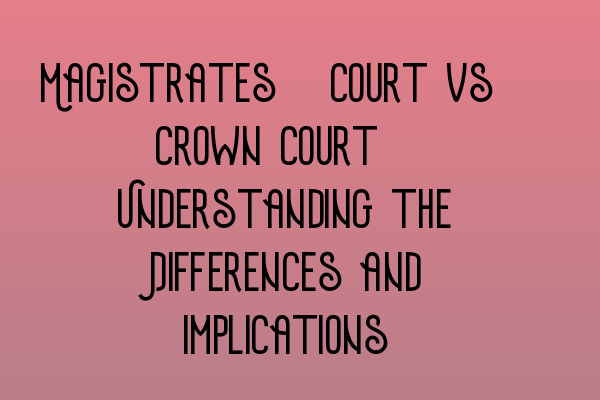Magistrates’ Court vs. Crown Court: Understanding the Differences and Implications
When it comes to criminal trials in the UK, they are typically heard in either the Magistrates’ Court or the Crown Court. These two courts have distinct differences and implications that both defendants and solicitors should be aware of. In this article, we will delve into the contrasting features of the Magistrates’ Court and the Crown Court, and discuss their implications for legal proceedings.
The Magistrates’ Court
The Magistrates’ Court is the lower tier of the criminal court system in the UK. It deals with less serious offenses, such as minor assaults, driving offenses, and thefts. The court is presided over by a panel of magistrates, also known as justices of the peace, who are laypersons appointed to make decisions based on their understanding of the community and the law. Magistrates’ Courts do not involve juries and are generally less formal than Crown Courts.
In the Magistrates’ Court, cases are usually brought by the prosecution on behalf of the state. Defendants have the option to plead guilty or not guilty. If a defendant pleads guilty, the magistrates have the power to impose fines, community orders, or short custodial sentences.
In cases where a defendant pleads not guilty, the trial is held in the Magistrates’ Court. However, if the offense is deemed more serious or complex, the case may be transferred to the Crown Court for a full trial with a judge and jury.
The Crown Court
The Crown Court is the higher tier of the criminal court system and deals with more serious offenses, including murder, rape, drug offenses, and fraud. Unlike the Magistrates’ Court, the Crown Court is presided over by a professional judge and a jury. The judge is responsible for ensuring that the trial is conducted fairly and according to the law.
Unlike the Magistrates’ Court, the Crown Court has the power to impose longer custodial sentences, including life imprisonment. Additionally, the jury in the Crown Court is responsible for determining the defendant’s guilt or innocence.
Defendants who are tried in the Crown Court have the option of electing for a trial with a jury or a judge-alone trial. This decision depends on the complexity and nature of the case, as well as the advice of the defendant’s legal representative.
Implications for Legal Proceedings
The choice between the Magistrates’ Court and the Crown Court can have significant implications for legal proceedings. The decision to hold a trial in the Crown Court indicates that the alleged offense is more serious and may result in a harsher penalty if the defendant is found guilty.
For defendants, it is crucial to have proper legal representation to navigate the complexities of both courts. A skilled solicitor with expertise in criminal law can help defendants understand the implications of their choices and guide them through the legal process.
Legal representation plays a vital role in presenting a strong defense and ensuring that the defendant’s rights are protected. If you or your company is in need of legal representation in the UK, SQE Criminal Law & Practice Law UK can provide expert advice and assistance. Visit our website to learn more about our services and how our dedicated team can help you.
Conclusion
In summary, the Magistrates’ Court and the Crown Court are two distinct entities within the UK criminal justice system. Understanding the differences and implications of each court is essential for defendants and solicitors alike. While the Magistrates’ Court deals with less serious offenses and is presided over by magistrates, the Crown Court handles more serious cases and involves professional judges and juries. The choice between the two courts can significantly impact the outcome of a trial, making legal representation crucial for defendants. Choose SQE Criminal Law & Practice Law UK for expert advice and assistance in navigating the complexities of the UK criminal justice system.
Related Articles:
- Legal Representation for Delaware LLCs in the UK: Expert Advice
- Legal Challenges for UK Businesses in the U.S.: Strategies for Overcoming Hurdles
- Legal Challenges for UK Businesses in the U.S.: Strategies for Overcoming Hurdles
- SQE Exam Prep: Essential Study Materials for Aspiring Solicitors
- Expert Testimonies in UK Courts: Building Strong Cases
